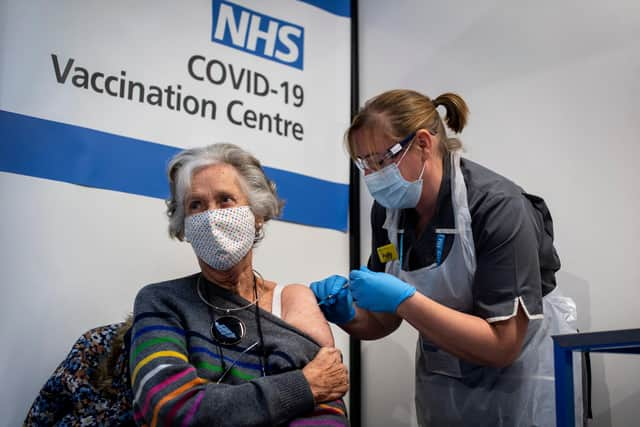Covid vaccines: The scientific case for booster dose is clear. It could be a life-saver – Professor Eleanor Riley
Arguments erupted over whether it was right (morally and medically) to deploy limited stocks of vaccine to protect already well-vaccinated countries against a winter surge rather than immunising the Global South.
Although it was not obvious at that time that boosters would be needed, by the time convincing evidence emerged it could already be too late. I said it was too close to call.
Advertisement
Hide AdAdvertisement
Hide AdWell, that was then, and this is now – and the evidence is clear. Neutralising antibodies, which are secreted into our nose and throat and stop the virus from gaining a foothold, decline with time and six months after the second vaccine dose are much less efficient at protecting us from infection.
Moreover, these antibodies are not as effective at neutralising the Delta variant (which has spread exponentially since the summer) as the original Wuhan virus on which current vaccines are based. And, crucially, people with waning antibodies are more likely to pass the infection to someone else than they would have been a few months earlier.
Whilst the current high rates of infection in the UK, especially among young people, are likely due to the arrival of the Delta variant and increased mixing, rather than waning vaccine immunity, infections are now spreading to the older and more vulnerable people who were vaccinated last winter and spring.
Although the overwhelming majority of these “breakthrough” infections are relatively mild, some people are feeling distinctly unwell. Furthermore, among the very frail, even a mild Covid-19 infection can be sufficient to undermine their physical well-being, leading to hospitalisation and death.
The good news is that booster vaccinations are remarkably effective, raising neutralising antibodies to concentrations far higher than seen after the initial two doses. This will likely translate into better protection against infection, including against Delta and other variants that may arise, with a resulting decline in cases, as seen after the extensive booster programme in Israel.


Also, the higher the starting concentration of antibodies the longer they stay above the protective concentration, suggesting that boosters should protect for significantly longer than the initial two-dose vaccination.
The likely worst case scenario for future winters is thus an annual Covid-19 booster alongside our flu vaccination. If, like flu, the vaccines can be matched to the currently circulating variant of the virus, so much the better.
The other piece of good news is that immunity against severe disease, which relies not just on antibodies but also on T cells present in our tissues, seems to decline much more slowly and is less affected by the strain of virus we encounter – so far, at least.
Advertisement
Hide AdAdvertisement
Hide AdFor the vast majority of us, this means that two doses of the vaccine should be enough to keep us out of hospital but a booster will markedly reduce our chances of being infected and thus our chances of passing the virus to someone who is old, frail or otherwise clinically vulnerable.
For those who are themselves vulnerable, a booster could be the difference between life and death.
In other words, getting your booster could be the difference between a happy family Christmas and a very, very unhappy one.
Eleanor Riley is professor of infectious disease immunology at the University of Edinburgh
A message from the Editor:
Thank you for reading this article. We're more reliant on your support than ever as the shift in consumer habits brought about by coronavirus impacts our advertisers.
If you haven't already, please consider supporting our trusted, fact-checked journalism by taking out a digital subscription.
Comments
Want to join the conversation? Please or to comment on this article.
